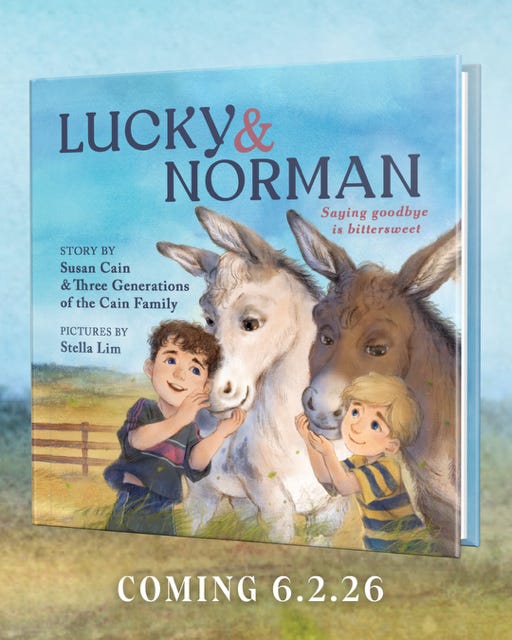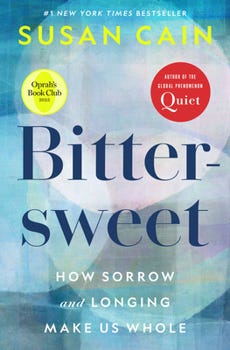How to say goodbye
On love, loss, and the world according to Lucky and Norman
One summer, our boys met two shy donkeys named Lucky and Norman — and their hearts were never quite the same. This is their story of love, loss, and learning how to say goodbye.
I’m very excited to share a new book that I wrote…with some very remarkable co-authors!
The book is called Lucky & Norman, and I wrote it with my beloved family members: husband Ken, sons Sam and Eli, and mother- and father-in-law, Bobbi and Al. It's a story for kids and families, and it touches on some of the same themes as Bittersweet.
I also want to give a special shout-out to our brilliant illustrator, Stella Lim - I LOVE the cover, and all of Stella’s luminous drawings!
Lucky & Norman arrives in stores on June 2 -- and you can preorder your copy now!
*
If you’re curious about the story, here is the grown-up version, which I told in Bittersweet:
When our sons were six and eight years old, we rented a summer house in the countryside for ten days. The boys swam, played outside, went for ice cream. They also fell in love with a pair of donkeys named Lucky and Norman, who lived in a fenced-off field next door. Every day the boys brought the donkeys apples and carrots. At first, the animals were too shy to accept these gifts. But after a few days, they hurried across the field at the sight of the children, who watched raptly as the donkeys ground their offerings into fruit juice spraying from their mouths.
It was a tender summer romance. But like all such romances, it had to end. Two nights before we went home, our usually happy boys started crying themselves to sleep, sad about leaving the donkeys. We told them that Lucky and Norman would be fine without us, that other families would feed them too. We said that who knows, we might return to the same house next summer, maybe they would see Lucky and Norman again.
But the only thing that consoled them was when we said that the pain of goodbye is part of life; that everyone feels it; that they would feel it again. This would seem a depressing reminder, but it had the opposite effect. When children (especially those growing up in relative comfort) grieve a loss, they’re crying in part because we’ve unwittingly taught them a delusion – that things are supposed to be whole; that real life is when things are going well; that disappointment, illness, and flies at the picnic are detours from the main road.
In “Spring and Fall,” the poet Gerard Manley Hopkins writes to a young girl who’s upset that the leaves are falling from the trees in Goldengrove, her favorite meadow. “Margaret, are you grieving/over Goldengrove unleaving?” the poet asks the girl.
He doesn’t tell her to stop crying, he doesn’t say that winter is beautiful too (even though it is). He tells her the truth about mortality: “It’s the blight that man was born for/It is Margaret you mourn for.”
This doesn’t mean that the kids shouldn’t go back to their games and their innocence and their glee. It means that the news of transience comes to children, as well as to adults, as a relief, as the end of the gaslighting. The sorrow they see on the glorious horizon is real; they’re not alone in perceiving it.
*
Lucky & Norman is, at heart, a children’s book — but it’s also a meditation on the themes that shaped Bittersweet: love and impermanence, joy and sorrow, and the way that beauty always carries a trace of loss (and vice versa).
Some questions for you to consider:
Do you remember your first experience of saying goodbye — to a pet, a summer, a friend?
How did you make sense of it then?
Do you notice any difference in the way you now approach goodbyes?
I’d love, as always, to hear from you! And, if you’d like to share this article or subscribe to The Quiet Life, you can do that here, too.




This is a timely post as I sit beside my Dad, likely on the Eve of his death. I welcome your readers to make comments on poetry or writings that have offered them solace and captured the whole experience of walking alongside someone in his dying process. I am a Therapist and have walked many people through their grief. In fact, my next post on my Substack will likely be about how to support a partner in their grief. I'm not looking for advice so much as beautiful words. And, I'm loving this community of tender hearts and bright minds. Thank you, Susan, and others.
As I read this post I am sitting in the family room of a hospice center, waiting for when my Aunt has been bathed and I am able to see her. Saying goodbye is hard and I have had to do it often in my life. I sit and hold her hand; if she is lucid I share memories and photographs. I visit so that she is not alone on this final journey. I know she will find peace on the other side. Thank you, Susan, for your post. It is a comfort.